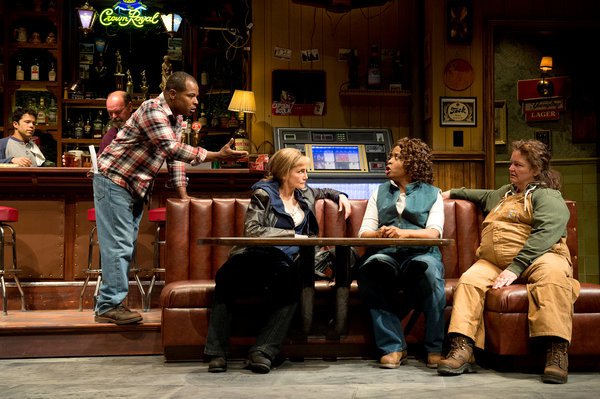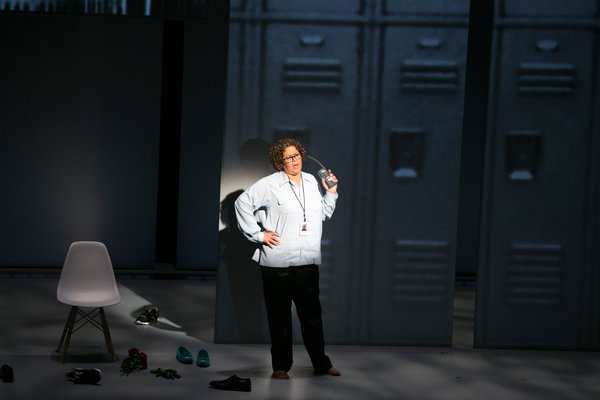|
Photo by Debra Lopez
|
|
From far left, Carlo Albán, Jack Willis, Kevin Kenerly, Terri McMahon, Kimberly Scott and K.T. Vogt, in the Oregon Shakespeare Festival production of Lynn Nottage’s “Sweat.” JENNY GRAHAM / OREGON SHAKESPEARE FESTIVAL By CHARLES ISHERWOOD SEPTEMBER 13, 2016 It’s not unusual for theater, like many of the arts, to address a pressing social or political issue. But what strikes me as unusual this fall is that most of such work comes from notable black female playwrights: Sarah Jones, Anna Deavere Smithand Lynn Nottage all have new (or new to New York) works that grapple with problems preoccupying contemporary culture. What’s more, the Signature Theater Company will begin its celebration of the work of Suzan-Lori Parks, whose plays, while stylistically exploratory and tremendously varied, nevertheless often have a powerful social consciousness. (Another example: Danai Gurira, whose “Eclipsed,” about sexual abuse of women in African civil wars, was a Tony nominee for best play this year and opens in San Francisco in the spring.) With Black Lives Matter and #OscarsSoWhite galvanizing attention; N.F.L. football players stirring controversy by failing to stand for the national anthem, to protest endemic racism; and even Beyoncé taking fierce political stands in her new music, these playwrights are in sync with the national mood, using the tools of theater to bring us face to face with hard facts about the world we live in. I am particularly looking forward to a further bracing encounter with Ms. Nottage’s “Sweat,” which I first saw at the Oregon Shakespeare Festival, and which begins performances at the Public Theater in October. In shaping this well-wrought drama about factory laborers facing bleak futures, Ms. Nottage and her director, Kate Whoriskey, drew on interviews with residents of a Pennsylvania city ranked among the poorest in the country. Mostly set in a bar where the workers hang out, the play explores the tensions — racial, interpersonal and otherwise — that tear at the fabric of the community, as jobs in manufacturing that once provided a solid middle-class living for millions of Americans grow scarce. I probably don’t need to remind you that anger at the decline of the rust-belt economies has been much discussed in the presidential election this year. But as in her previous plays, including “Intimate Apparel” and “Ruined,” Ms. Nottage nimbly avoids the didactic in her exploration of the fallout from the collapse of manufacturing. “Sweat” handily earns its grabby title, pulsing with the intensity of drama drawn directly from the hard-lived experiences of its characters. The playwright Sarah Jones, whose “Sell/Buy/Date” explores the lives of workers in the sex industry. The playwright and performer Anna Deavere Smith has a long history of addressing topics of meaty political or social currency, having examined racial conflict in “Fires in the Mirror” and “Twilight: Los Angeles, 1992,” and more recently the chronically problem-plagued health care system in “Let Me Down Easy.” Her new show, “Notes From the Field: Doing Time in Education,” focuses on how the failings of public schools are ineluctably intertwined with the high incarceration rates of young men, and young black men in particular. Drawing, as always, on dozens of interviews, Ms. Smith once again is the sole performer, using her virtuosic acting skills to embody various characters discussing an issue that has been boiling up in the public sphere for more than a year, as the deaths of black men at the hands of the police has become a matter of national attention. The production, directed by Leonard Foglia, is now at the American Repertory Theater in Cambridge, Mass., and begins performances in October at the Second Stage Theater in New York. The playwright and performer Anna Deavere Smith will star in her “Notes From the Field: Doing Time in Education.” EVGENIA ELISEEVA And this fall brings the welcome return of Sarah Jones, like Ms. Smith an incandescent performer who holds the stage on her own, most famously in her show “Bridge & Tunnel,” seen on Broadway in 2006. In her latest, “Sell/Buy/Date,” which begins performances in September and is presented by the Manhattan Theater Club, Ms. Jones explores the lives of workers in the sex industry. Like Ms. Smith — and, for that matter, Ms. Nottage — Ms. Jones likes to draw from life, and conducted nearly 100 interviews to gather material for the show, in which she will portray almost 20 different characters.
And, finally, this fall Ms. Parks becomes only the second black woman to have a series of productions dedicated to her work at the Signature Theater, after the pioneering playwright Adrienne Kennedy. Ms. Parks’s “residency” will comprise four plays, spanning both this season and next. It starts in October with “The Death of the Last Black Man in the Whole Entire World,” a surrealistic play that riffs pointedly on stereotypes of black culture as it depicts what the title suggests, an event that takes place over and over. In the spring comes “Venus,” which explores the life of a South African woman, Saartjie Baartman, who became an object of public fascination — not of a flattering kind — when she was taken to London to be exhibited in freak shows. It may well be a coincidence that the season will bring us a rich handful of plays by black women addressing issues reverberating through American culture today (and yesterday, and the day before). Or it may be an indication that while many playwrights continue to concentrate on staple American-theater themes of troubled families and personal strife, black women are using their gifts to widen our perspectives and confront truths that it might be more comfortable to ignore.
0 Comments
Your comment will be posted after it is approved.
Leave a Reply. |
Categories
All
|



 RSS Feed
RSS Feed